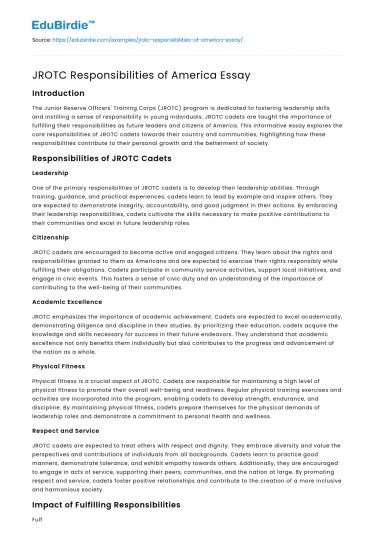Introduction
The Junior Reserve Officers' Training Corps (JROTC) program is dedicated to fostering leadership skills and instilling a sense of responsibility in young individuals. JROTC cadets are taught the importance of fulfilling their responsibilities as future leaders and citizens of America. This informative essay explores the core responsibilities of JROTC cadets towards their country and communities, highlighting how these responsibilities contribute to their personal growth and the betterment of society.
Responsibilities of JROTC Cadets
Leadership
One of the primary responsibilities of JROTC cadets is to develop their leadership abilities. Through training, guidance, and practical experiences, cadets learn to lead by example and inspire others. They are expected to demonstrate integrity, accountability, and good judgment in their actions. By embracing their leadership responsibilities, cadets cultivate the skills necessary to make positive contributions to their communities and excel in future leadership roles.
Citizenship
JROTC cadets are encouraged to become active and engaged citizens. They learn about the rights and responsibilities granted to them as Americans and are expected to exercise their rights responsibly while fulfilling their obligations. Cadets participate in community service activities, support local initiatives, and engage in civic events. This fosters a sense of civic duty and an understanding of the importance of contributing to the well-being of their communities.
Academic Excellence
JROTC emphasizes the importance of academic achievement. Cadets are expected to excel academically, demonstrating diligence and discipline in their studies. By prioritizing their education, cadets acquire the knowledge and skills necessary for success in their future endeavors. They understand that academic excellence not only benefits them individually but also contributes to the progress and advancement of the nation as a whole.
Physical Fitness
Physical fitness is a crucial aspect of JROTC. Cadets are responsible for maintaining a high level of physical fitness to promote their overall well-being and readiness. Regular physical training exercises and activities are incorporated into the program, enabling cadets to develop strength, endurance, and discipline. By maintaining physical fitness, cadets prepare themselves for the physical demands of leadership roles and demonstrate a commitment to personal health and wellness.
Respect and Service
JROTC cadets are expected to treat others with respect and dignity. They embrace diversity and value the perspectives and contributions of individuals from all backgrounds. Cadets learn to practice good manners, demonstrate tolerance, and exhibit empathy towards others. Additionally, they are encouraged to engage in acts of service, supporting their peers, communities, and the nation at large. By promoting respect and service, cadets foster positive relationships and contribute to the creation of a more inclusive and harmonious society.
Impact of Fulfilling Responsibilities
Fulfilling the responsibilities of JROTC cadets has a significant impact both on the individuals themselves and on society. By developing leadership skills, cadets are equipped to make a positive difference in their communities. They become capable of solving problems, guiding others, and promoting teamwork. Through their commitment to academic excellence, cadets prepare themselves for higher education and future careers, enhancing their prospects for success.
By embodying good citizenship and engaging in community service, JROTC cadets contribute to the betterment of society. They become active participants in community development, addressing local needs, and fostering a sense of unity and cooperation. The values instilled through JROTC prepare cadets to become responsible and engaged citizens who actively participate in the democratic process and strive to create positive change.
Conclusion
The responsibilities of JROTC cadets go beyond mere training; they shape the character, values, and sense of purpose of future leaders. Cadets are entrusted with the responsibilities of leadership, citizenship, academic excellence, physical fitness, and respect and service. By fulfilling these responsibilities, cadets develop the skills and attributes necessary to succeed and make a positive impact in their communities and the nation. JROTC cadets exemplify the principles of responsible citizenship, preparing themselves to become leaders who will contribute to the progress and success of America.






 Stuck on your essay?
Stuck on your essay?

